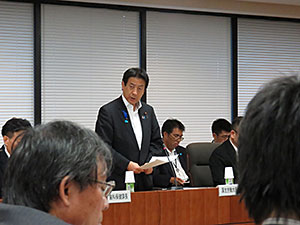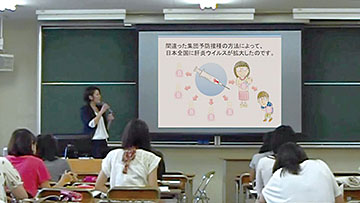Please know our thoughts.
As a result of governmental actions (not responding adequately to the use of syringes in mass vaccinations), many people lost their lives or were suffered many years bad health conditions. And they were suffered also prejudice and discrimination and were anxiety for the future. Many of them were suffered from financial burden. Those sufferings are still continuing.
We don't want to the government such actions do again. We want everyone to know about these damage and want our experiences to be used to create a society without prejudice and discrimination.
We are doing activities such as, (1) commitment to the government and, (2) patient lectures, in order to make people know about our thoughts and sufferings and to eliminate prejudice and discrimination.
Here, we will introduce our activities.
Encouragement to the country

Labor and Welfare in fiscal 2016
For example, in a regular discussion with the Minister of Health, Labor and Welfare in 2016, we received a response from the minister that the significance of learning the hepatitis B problem as a lesson is significant and will be considered positively. This is a big step.
Patient lectures
Patient lectures are: "Those activities that patients and families with hepatitis B talk about their experiences and make people to know about hepatitis B disease and mistakes of past government actions, and by doing those, to eliminate prejudice and discrimination, and to avoid repeating the same mistakes. We think it is important that patients and bereaved family themselves tell their sufferings by their own voices.Since 2014, we have conducted patient lectures at various universities, vocational schools, high schools and junior high schools.
The actual number of patient lectures is about 270 at educational institutions and the number of participants is about 30,000 (as of the end of March 2019).
->Click here for details on the results of patient lectures (Japanese)
Many patients and families do not talk about illness. This is because there is anxiety that they will face prejudice or discrimination when they convey illness.

Impressions of students, pupils, and children who received patient lectures
Here are just a few of the many voices impressed by the lecture.
- It was nice to know the patient's thoughts.
- When I listened to the actual patient's story, I cried that I had a really hard time.
- I was very sorry to hear that there were people who discriminated against. I vowed never to do that.
- When meeting or interacting with a patient, I would like to respond in the same way as a normal person.
- In the future, when I become a nurse, I think it is important to have correct knowledge as well as mental care for patients.
- I think they shouldn't increase the number of sick people to save money by using same syringe.
- I would like to see a drug that can heal hepatitis B.